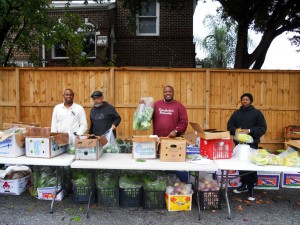 As more vegetarian restaurants open up in the United States, there’s an opportunity for strengthening food activism. The restaurant business is a fickle industry in which most entrepreneurs fail miserably due to rising food costs, rent, and inconsistent customer support. But it seems that restaurants that connect with the community and adopt new models of dining are doing just fine. Instead of approaching the restaurant industry with traditional capitalistic values, they’ve built a business model around community profit sharing and linked their business to a social cause.
As more vegetarian restaurants open up in the United States, there’s an opportunity for strengthening food activism. The restaurant business is a fickle industry in which most entrepreneurs fail miserably due to rising food costs, rent, and inconsistent customer support. But it seems that restaurants that connect with the community and adopt new models of dining are doing just fine. Instead of approaching the restaurant industry with traditional capitalistic values, they’ve built a business model around community profit sharing and linked their business to a social cause.
 Clearly, vegetarian restaurants aren’t the only food spots that have adopted this method of business. However, vegetarian spots are at a certain disadvantage being that the majority of the country, and likely the local community, do not practice plant-based eating lifestyles. So what’s the allure to a vegetarian restaurant if you’re accustomed to dining with a plethora of meat options? Well, if you’re like the restaurant Home Grown in Atlanta, the public knows that the owners grow the food in an urban garden ran by a local community that shares in the profits. If you’re the soon-to-be vegetable co-op Sweet Work in Harlem, the public is invested in your success because you’ve built in a worker-ownership model that reaches out to local foster kids that have out grown the system for employment and then after a set period of time, gives them shares in the company.
Clearly, vegetarian restaurants aren’t the only food spots that have adopted this method of business. However, vegetarian spots are at a certain disadvantage being that the majority of the country, and likely the local community, do not practice plant-based eating lifestyles. So what’s the allure to a vegetarian restaurant if you’re accustomed to dining with a plethora of meat options? Well, if you’re like the restaurant Home Grown in Atlanta, the public knows that the owners grow the food in an urban garden ran by a local community that shares in the profits. If you’re the soon-to-be vegetable co-op Sweet Work in Harlem, the public is invested in your success because you’ve built in a worker-ownership model that reaches out to local foster kids that have out grown the system for employment and then after a set period of time, gives them shares in the company.
 These untraditional forms of capitalism build businesses that are invested in community and extend food activism to combat overlapping oppressions, such as local poverty. Whether a vegetarian restaurant, farm, or store enter the community, it ought to consider the local ramifications of its presence and the power it has to make a difference in surrounding neighborhoods. If facets of vegetarianism are built on food consciousness and combating exploitive meat production, those same principles should be applied to vegetarian businesses, so that we’re not giving oppression a plant-based face.
These untraditional forms of capitalism build businesses that are invested in community and extend food activism to combat overlapping oppressions, such as local poverty. Whether a vegetarian restaurant, farm, or store enter the community, it ought to consider the local ramifications of its presence and the power it has to make a difference in surrounding neighborhoods. If facets of vegetarianism are built on food consciousness and combating exploitive meat production, those same principles should be applied to vegetarian businesses, so that we’re not giving oppression a plant-based face.
But of course, vegetarian businesses are free to practice whatever model of business they choose. It’s not required that vegetarian restaurants participate in the locavore movement, and source their food locally. It’s not incumbent upon vegetarian stores to give workers a share in store profits. But imagine if more vegetarian businesses did and how it would reposition vegetarianism as an ally to struggling communities and lower class demographics. Vegetarianism might just become a movement that goes beyond accommodating privileged races and classes. It might just become a solution for everyone.







I agree with sentiments of this article. We don’t have a lot of conversations in America about capitalism, re-imagining a new form of capitalism — something that benefits all people and still rewarding creativity and ambition, but I guess that wouldn’t be capitalism.
On the issue of Vegetarian restaurants, I feel, with the end of the cheap hydrocarbon era (oil, coal, and gas), most people will be forced to eat more vegetables, legumes, grains, and fruit. Vegetarian restaurants are in a unique position, much like this article states, to bring a new way of serving communities with restaurants that add more culture and opportunity than the bourgeois ethics of profit and real estate.
Thanks for this article …
I’m a big fan of the worker-ownership model, and it seems to work best for start-ups geared toward offering food that is not always available in traditional restaurants. I hope frugivore continues to promote and explore these types of businesses
You’re giving capitalism too much credit to call this a form of capitalism. This goes beyond capitalism by creating a community-good-centered institution for feeding a community, instead of a profit-centered institution. Hopefully the food movement will continue to see the connections that you’re pointing to, and not fall for “giving oppression a plant-based face.” As a food industry worker, I know the difference between businesses that are good for just the planet, and those that are good for both the planet and the people involved in the business. For another example of the better kind, check this out: http://www.realfoodrealjobs.org/examples/
Way to go Sweet Work, and way to go all food workers!
@Harlem Russell: On the fair treatment of workers in various parts of the food industry, check out the Domestic Fair Trade Association: http://www.thedfta.org/. They are proposing standards and legislation and putting a face on the problems of workers in the food industry.
Nice article. Group-based democratic ownership is really compatible with making it possible to live one’s values. Other examples of great food-based co-ops include worker-owned Local Sprouts in Portland, ME (http://www.localsproutscooperative.com/), consumer-owned Sevananda Food Co-op in Atlanta, GA (http://www.sevananda.coop/about-2/), farmer-owned Organic Valley (marketing) and Deep Root Organic (distribution) (http://www.organicvalley.coop/, http://www.deeprootorganic.com/). As you can see co-ops exist throughout the food system–for a complete view on co-ops in the food system, see this poster: http://www.cdi.coop/images/cooperativesandfoodsystems.jpg. What’s great is that when co-ops get together, they can change the marketplace: look at what Neighboring Food Co-ops is doing with frozen local vegetables, now offered through local food co-ops: http://nfca.coop/farmtofreezer.